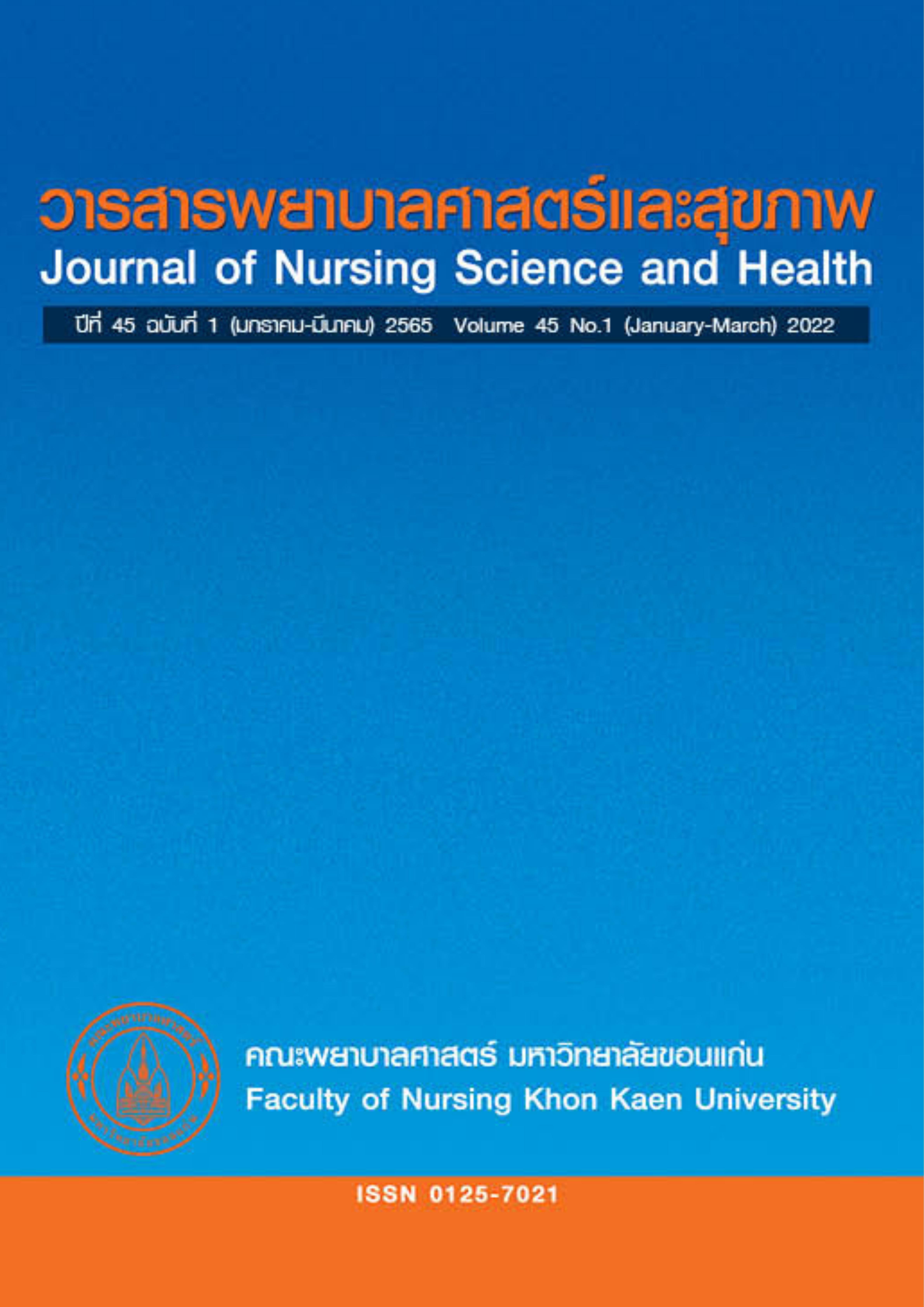ผลของการใช้สถานการณ์จำลองเสมือนจริงในการเตรียมความพร้อมก่อนขึ้นฝึกปฏิบัติ วิชาปฏิบัติการผดุงครรภ์ ต่อความรู้ ความพึงพอใจและความมั่นใจในตนเองของนักศึกษาพยาบาล ชั้นปีที่ 4 คณะพยาบาลศาสตร์ มหาวิทยาลัยขอนแก่น
คำสำคัญ:
การเตรียมความพร้อม, ความพึงพอใจ, ความมั่นใจในตนเอง, ความรู้, นักศึกษาพยาบาล , สถานการณ์ จำลองเสมือนจริงบทคัดย่อ
การวิจัยกึ่งทดลอง เพื่อศึกษาผลของการใช้สถานการณ์จำลองเสมือนจริงในการเตรียมความพร้อมก่อนขึ้นฝึกปฏิบัติวิชาปฏิบัติการผดุงครรภ์ต่อความรู้ความพึงพอใจและความมั่นใจในตนเองของนักศึกษาพยาบาล กลุ่มตัวอย่าง คือ นักศึกษาพยาบาลชั้นปีที่ 4 จำนวน 76 คน คัดเลือกแบบเฉพาะเจาะจง ศึกษาหนึ่งกลุ่มเปรียบเทียบก่อนและหลังการทดลอง เก็บข้อมูลระหว่างเดือนกุมภาพันธ์-มีนาคม 2563 เครื่องมือวิจัย ประกอบด้วย 1) สถานการณ์จำลองเสมือนจริงด้านการผดุงครรภ์ระดับง่ายและระดับยาก ตรวจสอบความตรงของเนื้อหาโดยผู้ทรงคุณวุฒิได้ค่าดัชนีความตรงตามเนื้อหาเท่ากับ 1.00 2) แบบทดสอบความรู้และ 3) แบบสอบถามความพึงพอใจและความมั่นใจในการเรียนรู้
วิเคราะห์ข้อมูลโดยใช้สถิติเชิงพรรณนา สถิติทดสอบค่าทีคู่ (paired sample t-test) ผลการศึกษาพบว่า
นักศึกษาพยาบาลที่ได้รับการเตรียมความพร้อมก่อนขึ้นฝึกปฏิบัติวิชาการผดุงครรภ์โดยใช้สถานการณ์จำลองเสมือนจริง มีคะแนนเฉลี่ยความรู้และความมั่นใจในตนเองหลังทดลองสูงกว่าก่อนทดลองอย่างมีนัยสำคัญทางสถิติและมีความพึงพอใจอยู่ในระดับมาก ผลการวิจัยสามารถนำใช้เป็นแนวทางในการส่งเสริมการเตรียมความพร้อมโดยใช้สถานการณ์จำลองเสมือนจริงก่อนขึ้นฝึกปฏิบัติวิชาการผดุงครรภ์สำหรับนักศึกษาพยาบาล
เอกสารอ้างอิง
Saetan C, Kampun S. Stressandcopingstrategies ofnursingstudents inclinicalpracticepreparation of maternal and child health nursing and midwifery 1. JHNR 2014; 30(3): 54-63. (in Thai)
Lertsakornsiri M. The relationships between personal factors,environment factorsandstress, stress management during practice in labor room ofnursingstudentsatSaint Louis College. JRTAN 2014; 15(2): 270-9. (in Thai)
Strategic plan of Faculty of Nursing, 2020-2023. Khon Kaen: Faculty of Nursing, Khon Kaen University. (in Thai)
Suwannakeeree W, Jullmusi O, Tangkawanich T. Simulation-based learning management for nursingstudents. JNSCU 2016; 28(2): 1-14. (in Thai)
Department of disease control. Guideline for disease control and prevention of coronavirus disease 2019 for people. 2nd ed. Bangkok: Agriculturalcooperativeprintingdemonstrations of Thai; 2020. (in Thai)
Kim J, Park JH, Shin S. Effectiveness of simulation-based nursing education dependingonfidelity: A meta-analysis. BMC Medical Education 2016;16: 1-8.
La Cerra C, Dante A, Caponnetto V,Franconi I, Gaxhja E, Petrucci C, et al. Effects of high-fidelity simulation based on life-threatening clinical condition scenarios on learning outcomes of undergraduate and postgraduate nursing students: A systematic review and meta-analysis. BMJ 2019; 9: 1-11.
Lendahls L,OscarssonMG.Midwiferystudents’ experiences of simulation-and skills training. Nurse Education Today 2017; 50: 12-6.
Motola I, Devine LA, Chung HS, Sullivan JE, Issenberg SB. Simulation in healthcare education: A best evidence practical guide AMEE GuideNo. 82.Medical Teacher 2013; 35(10):e1511-30.
Tritrakarn P. Efficient debrief of medical simulations. Siriraj Medical Bulletin 2017; 10(3): 180-5. (in Thai)
Jefferies PR. A framework for designing, implementing, and evaluating simulations used as teaching strategies in nursing. Nursing EducationPerspective 2005; 26: 96-103.
Norkaeo D, Kangyang M, Buranarom P, TaveekaewC,KanbuparN,PromwongW,et al. The effect of high-fidelity simulation teaching program on student nurses’ knowledge, skill, and self-efficacy regarding nursing care for pregnant woman with complication. NJPH 2019; 29(3): 53-65. (in Thai)
Chubkhuntod P, Elter PT, Gaewgoontol N, Potchana R. Effects of simulation based learning model on knowledge, self-efficacy and abilities of applying nursing process skills during intrapartum care of nursing students. JHS 2020; 29(6):1062-72. (in Thai)
Wuttisakpisarn S, Chudjuajeen S, Taonoi K. Effects of high-fidelity simulation based learning for preparation of practice on knowledge, satisfaction, and self-confidence of nursing students. J Hlth Sci Res 2020; 14(2):70-81. (in Thai)
Hughes C, Anderson G, Patterson D, O’Prey M. Introducing an obstetric emergency training strategy into a simulated environment. British Journalof Midwifery 2014; 22(3):201-7.
Sinthuchai S, Ubolwan K, Boonsin S. Effects of high-fidelity simulation based learning on knowledge, satisfaction, and self-confidence among the fourth year nursing students in comprehensive nursing care practicum. RNJ 2017;23(1):113-27. (in Thai)
Chiannilkulchai N, Tengkiattrakul S. The effect of training in operating room by using realoperatingroom simulationonperioperative technical skill of nursing students. SongklanagarindJ Nurs 2016; 36(1): 55-67.(in Thai)
Tantalanukul S, Rattanasak S, Sengpanich C, Srisung W, Tungkawanich T. The effect of simulation-based learning on the ability development of primary medical care practicum of nursing student at Boromarajonani College of Nursing Uttaradit. BCNUT J Nurs 2016; 8(1):49-58. (in Thai)
Suwannakeeree W, Jullmusi O, Inkaew T, Tangkawanich T, Rueangram S. Satisfaction and self-confidence in critical care nursing of nursingstudentslearningwithsimulation-based learning. Journal of Nursing and Health Sciences 2017; 11(3):167-77. (in Thai)
Catling C, Hogan R, Fox D, Cummins A, Kelly M, Sheehan A. Simulation workshops with first year midwifery students. Nurse EducationinPractice 2016; 17: 109–15.
Watters C, Reedy G, Ross A, Morgan NJ, Handslip R, Jaye P, et al. Does interprofessional simulation increase self-efficacy: Acomparative study. BMJ Open 2015; 5: 1–7.
ดาวน์โหลด
เผยแพร่แล้ว
รูปแบบการอ้างอิง
ฉบับ
ประเภทบทความ
สัญญาอนุญาต
ลิขสิทธิ์ (c) 2022 วารสารพยาบาลศาสตร์และสุขภาพ

อนุญาตภายใต้เงื่อนไข Creative Commons Attribution-NonCommercial-NoDerivatives 4.0 International License.
วารสารพยาบาลศาสตร์และสุขภาพเป็นเจ้าของลิขสิทธิ์ในการเผยแพร่ผลงานที่ตีพิมพ์ห้ามผู้ใดนำบทความที่ได้รับการตีพิมพ์ในวารสารพยาบาลศาสตร์และสุขภาพไปเผยแพร่ในลักษณะต่าง ๆ ดังนี้ การนำบทความไปเผยแพร่ออนไลน์ การถ่ายเอกสารบทความเพื่อกิจกรรมที่ไม่ใช่การเรียนการสอน การส่งบทความไปตีพิมพ์เผยแพร่ที่อื่น ยกเว้นเสียแต่ได้รับอนุญาตจากวารสารพยาบาลศาสตร์และสุขภาพ



